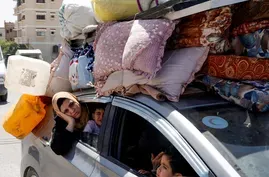
What to know about the start of U.S.-Iran negotiations
Clip: 4/12/2025 | 6m 14sVideo has Closed Captions
What to know about the start of negotiations between Iran and the U.S. under Trump
In Oman on Saturday, the United States and Iran appeared to take the first steps that could lead to a new agreement to limit Iran’s nuclear activities and lift U.S. economic sanctions. The White House described the talks as “very positive and constructive.” Iran’s foreign minister said the two sides will meet again in a week. John Yang speaks with policy analyst Karim Sadjadpour for more.
Problems with Closed Captions? Closed Captioning Feedback
Problems with Closed Captions? Closed Captioning Feedback
Major corporate funding for the PBS News Hour is provided by BDO, BNSF, Consumer Cellular, American Cruise Lines, and Raymond James. Funding for the PBS NewsHour Weekend is provided by...

What to know about the start of U.S.-Iran negotiations
Clip: 4/12/2025 | 6m 14sVideo has Closed Captions
In Oman on Saturday, the United States and Iran appeared to take the first steps that could lead to a new agreement to limit Iran’s nuclear activities and lift U.S. economic sanctions. The White House described the talks as “very positive and constructive.” Iran’s foreign minister said the two sides will meet again in a week. John Yang speaks with policy analyst Karim Sadjadpour for more.
Problems with Closed Captions? Closed Captioning Feedback
How to Watch PBS News Hour
PBS News Hour is available to stream on pbs.org and the free PBS App, available on iPhone, Apple TV, Android TV, Android smartphones, Amazon Fire TV, Amazon Fire Tablet, Roku, Samsung Smart TV, and Vizio.
Providing Support for PBS.org
Learn Moreabout PBS online sponsorshipJOHN YANG: Good evening.
I'm John Yang.
In Oman today, the United States and Iran appear to have taken the first steps that could lead to a new agreement to limit Iran's nuclear activities and lift U.S. Economic sanctions.
On social media, the Omani foreign minister who mediated today's indirect talks said they took place in a friendly atmosphere conducive to bridging viewpoints.
The White House described the meeting as very positive and constructive.
And the Iranian foreign minister said the two sides briefly interacted when their paths crossed at the end of today's session and that they will meet again next Saturday.
Karim Sadjadpour is a Senior Fellow at the Carnegie Endowment for International Peace.
He focuses on Iran and US Middle east policy.
Karim, a little brief encounter, it sounds like in a hallway agreement to meet again.
Is this about as much as one could hope out of this meeting?
KARIM SADJADPOUR, Carnegie Endowment for International Peace: The fact that they've agreed on a second meeting I think is as much anyone could have hoped for.
But our expectations should be realistic.
This is not a negotiation about a U S.-Iran rapprochement, a Nixon to China moments.
You know, normalization.
This is really whether the two sides can agree on something which limits Iran's nuclear program.
And that's going to be a tall order.
JOHN YANG: President Trump says he wants a stronger agreement than the one President Obama got.
Is that possible?
KARIM SADJADPOUR: I think that's going to be very difficult for President Trump because when he pulled out of the deal in 2018, Iran essentially put his foot on the gas.
And if you think of getting a nuclear bomb is a 26 mile marathon.
Iran is in mile 25 right now.
And so the big challenge President Trump is going to have is reversing Iran's program significantly.
And if he's not able to do that, he's going to have to answer to two constituencies.
One are congressional Republicans and the other Israel.
And you know whether those two constituencies will accept Trump signing off on a nuclear deal that was weaker than the Obama deal, which he abrogated.
JOHN YANG: The Iranian foreign minister, Abbas Araghchi, talked a little bit about the end of this meeting, about another of Mr. Trump's goals, and let's listen to a bit of that.
ABBAS ARAGHCHI, Foreign Minister, Iran (through translator): The American side also said their aim is to reach an agreement in the shortest possible time.
But of course, this won't be easy and will require necessary will from both sides.
JOHN YANG: The first agreement took a while to negotiate.
Is there a potential pitfall in making speed a priority?
KARIM SADJADPOUR: These negotiations are not going to be about the art of the deal.
They're going to be about the science of verification.
These are not theatrical discussions.
These are very technical discussions.
And here there is a huge imbalance between the Iranian side and the American side.
And that the Iranian side, you have several Iranian diplomats who have been thinking deeply and negotiating these issues for two decades.
And, and on the U.S. side, you have President Trump's friend Steve Witkoff, who's been thinking about this for perhaps two months.
And so it's true that America obviously has far more leverage over Iran than they have.
But there's an imbalance in terms of expertise when it comes to the negotiating teams.
JOHN YANG: Why now?
What's motivating each side to come to the table now?
KARIM SADJADPOUR: Well, Iran is one of the most sanctioned nations in the world.
It's a very deeply unpopular regime domestically.
It's been humiliated over the last several months in the region.
Israel is, has taken out several of Iran's proxies and Israel took out Iran's military air defense systems.
So militarily, Iran is very vulnerable.
On the U.S. side, Trump has always made clear that he's keen on reaching a deal.
And the fact that Iran is kind of inching towards nuclear weaponization has obviously given him a much greater sense of urgency.
JOHN YANG: You mentioned the economy, Iran's economy, the sort of the verge of Iran getting a nuclear weapon.
What else is at stake here?
KARIM SADJADPOUR: If you really break this down, you have two countries ruled by very different leaders.
Right.
President Trump likes theatrics of negotiations and doing deals and actually has been clear about the fact that he wants to resolve U S.-Iran relations.
On the Iranian side, you have Ayatollah Ali Khamenei, arguably the longest serving dictator in the world at age 85.
If he wrote a book, it wouldn't be the Art of the Deal, it's the Art of Resistance.
That's something he's prided himself on for four decades as being hostile to the United States.
The identity of the Islamic Republic of Iran is contingent on death to America.
Right.
So for him, it's swallowing a lot of pride for his diplomats to sit down directly and negotiate with the United States.
And I think there's really an imbalance of expectations here because as I mentioned, even President Trump's statement today made clear that he wants to see these negotiations lead to a resumption of relations between America and Iran, whereas Ayatollah Khamenei has much more narrow goals.
A temporary tactical compromise in order for him to get sanctions relief and avert an Israeli strike on Iran.
JOHN YANG: You mentioned Israel.
They are not at the table.
They see a nuclear powered Iran as a existential threat.
They say they want a total elimination of their nuclear program.
What role are they going to play even though they're not at the table?
KARIM SADJADPOUR: Well, I think Israel obviously is.
Has a very close relationship with President Trump.
They're going to make their concerns very well known, not only to the White House, but to Congress and the U.S. media.
And we've already seen statements from people within the Trump administration like his national security adviser, Mike Waltz, saying that the outcome here should be the so called Libya model, which is a total dismantlement of Iran's program.
And so it already appears that within the Trump administration there's different views about what the end game should be.
And Israel is obviously going to be putting the thumb on the scale for a much more hawkish outcome.
JOHN YANG: Karim Sadjadpour, thank you very much.
KARIM SADJADPOUR: Thank you, John.
New book gives parenting lessons from the disabled community
Video has Closed Captions
New book ‘Unfit Parent’ provides valuable parenting lessons from the disabled community (6m 33s)
News Wrap: Israeli military cuts off Rafah in southern Gaza
Video has Closed Captions
News Wrap: Israel cuts off Rafah as it expands military activity in Gaza (2m 49s)
Why patients are paying surprise fees at the doctor's office
Video has Closed Captions
Why patients are getting hit with surprise hospital fees for routine medical care (7m 59s)
Providing Support for PBS.org
Learn Moreabout PBS online sponsorshipSupport for PBS provided by:
Major corporate funding for the PBS News Hour is provided by BDO, BNSF, Consumer Cellular, American Cruise Lines, and Raymond James. Funding for the PBS NewsHour Weekend is provided by...














